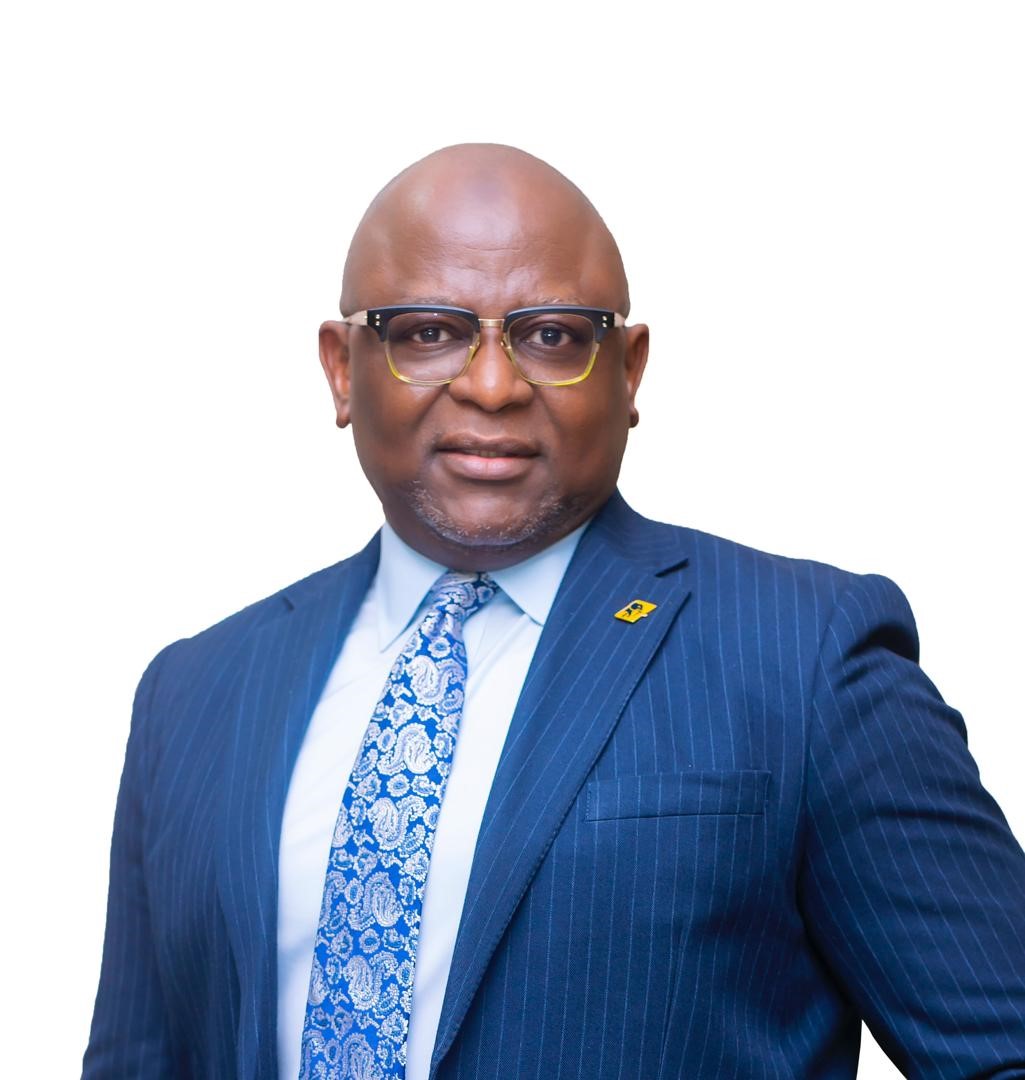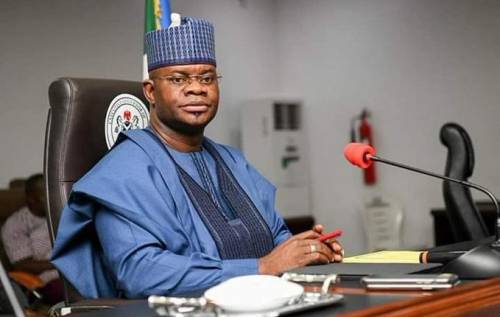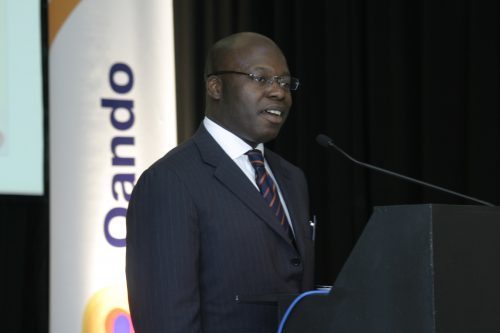News and Report
Adesola Adeduntan: Banker Extraordinaire Gets Global Recognition
Published
4 years agoon

First Bank of Nigeria Limited has under its Chief Executive Officer, Dr. Adesola Adeduntan positioned the brand as a clear leader in promoting financial inclusion in Nigeria. The bank has continually reached the underbanked and un-banked population to reduce poverty, bolster economic growth and development of Nigeria. These milestones have earned Adeduntan the 2019 Cranfield University Distinguished Alumnus of the Year Award. The Award is the School’s highest honour and recognises his significant success within the banking industry and sector while upholding the highest standards in business practice.
The 21st century has been remarkable in many aspects. It witnessed the rise of a global economy and increase in power of private enterprise that gives individuals power to run businesses successfully.
It is a century where visionary men dared, achieved and moved longstanding businesses to enviable heights. These private sector leaders succeeded where others feared to try.
Dr. Adesola Adeduntan, the Chief Executive Officer of First Bank of Nigeria Limited and Subsidiaries is one of such leaders.
Adeduntan who took the role to run one of Nigeria’s biggest Tier-1 bank since January 1, 2016 has kept in on a path of sustainable growth and contributions to the nation’s domestic economy.
Prior to his appointment, he was an Executive Director and Chief Financial Officer for the Bank since 2014 when he was appointed to the Board of the Bank. Before joining FirstBank in 2014, Adeduntan was a Director and the pioneer Chief Financial Officer/Business Manager of Africa Finance Corporation (AFC).
He has served as a Senior Vice-President & Chief Financial Officer at Citibank Nigeria Limited, a Senior Manager in the Financial Services Group of KPMG Professional Services and a Manager at Arthur Andersen Nigeria, among other exciting career paths.
The bank chief with several years of banking experience has contributed immensely to sustaining FirstBank’s position as a leading Tier-1 bank in the Nigerian financial services space.
Adeduntan is the recipient of the 2019 Cranfield University Distinguished Alumnus of the Year Award, United Kingdom. The Award is the School’s highest honour and recognises those individuals who have achieved significant success within their industry and sector while upholding the highest standards in business practise.
The astute banker has carved a niche for himself by positioning the FirstBank brand as a clear leader in promoting financial inclusion in Nigeria given the significant strides the bank has made in reaching the underbanked and un-banked population designed to reduce poverty and importantly bolster economic growth and development of Nigeria.
As a global thought leader, Adeduntan is well-sought after and has shared his experience and expertise at notable events across the world espousing and even envisioning financial inclusion in the next 125 years.
These events include the 2019 Ethical Finance Conference in the UK which had in attendance over 500 leading finance practitioners from all over the world including with Sarah Breeden, Bank of England; Dame Susan Rice, Banking Standards Board; Gary Gillespie, Chief Economist, Scottish Government; a keynote speaker at 2019 University of Edinburgh Sustainable Business in Africa Forum; The Africa CEO Forum 2018, Abidjan; the London School of Economics and Political Science (LSE) Annual State of Nigeria Conference as well as 2019 LSE Africa Summit.
Adeduntan has won other laurels due to his sustained professional achievements; significant economic and social impact; leadership qualities as well as a role model. These include the 2018 African Banker of the Year in African Leadership Magazine Persons of the Year Award in South Africa.
Analysts believe that the award of the 2019 Cranfield University Distinguished Alumnus of the Year Award, United Kingdom to Adeduntan was in recognition of key milestones the bank has achieved under his leadership.
Agent Banking Milestones
First Bank has under Adeduntan expressed its commitment to continue to drive financial inclusion through its over 37,000 Firstmonie Agent Network present in 99 per cent of the 774 local government areas and has processed over N2 trillion through the initiative.
FirstBank’s Firstmonie service provides financial/banking solutions to rural and semi-urban locations across the country. Such solutions include account opening, cash deposit, cash withdrawals, airtime purchase, bill payments and much more. Through this channel, the bank is committed to providing convenient services that engender and provides ease of access to banking products, thereby saving time and travel costs for users of the network.
While speaking at the Firstmonie Agent Banking National Award ceremony, held in Lagos, Adeduntan said the firstmonie agent network is a channel through which the bank expresses its unalloyed commitment and passion to promote opportunities of financial services for every Nigerian , especially within the low-income segment.
He said: “The initiative has witnessed several changes in the operating structure and value proposition of FirstBank. In December 2017, the bank ran a pilot test with over 400,000 transactions processed and following the success of the first run, it re-launched in 2018.”
According to Adeduntan, through Firstmonie, the bank has remained at the forefront of driving nation-wide inclusion, given our belief that access to financial services is part of lifting people out of poverty and fostering collective national economic development.
Adeduntan said: “The key strengthen of the bank’s services is to look at the gaps in the society and develop products and services that address the gap. As an integral part of our strategy, we believe in working with the CBN to improve financial inclusion index of the country. We would, at FirstBank, assist Nigeria to address poverty and hunger, thereby promoting security of life and property. Because when people are gainfully employed, the implication is that they will think less of crime,” he said.
Banking with Technology
Banking and technology are becoming inseparable. FirstBank under Adeduntan is driving growth and customer services with technology. The 2019 Financial Technology (Fintech) Summit organised by the bank was an opportunity for the bank to emphasise the need for technology in e-business, digital offering, agent banking, wholesale/ transaction banking, retail/consumer lending and Small and Medium Enterprises (SMEs) productivity.
He noted that as a Tier-1 lender, which celebrated its 125th anniversary last March, the bank had been able to maintain its leadership position in the industry by leveraging technology to offer innovative solutions through its product offerings.
According to him, the theme of the summit, “Banking + Tech = Solving Real Problems,” reflects the reality that technology can be applied to add value in all spheres of life. He pointed out that despite the remarkable progress recorded by Nigerian banks through the use technology, there is still a lot to be done in that regard.
Adeduntan said FirstBank remained committed to putting its customers first with excellent financial services and devising new ways of effectively meeting customers’ financial needs.
“Customer experience and innovation are key in our approach to satisfying our customers. As a leading banking services solutions provider, FirstBank has continued to set the pace in the financial services industry, coming up with new initiatives to provide financial products and services with greater speed, accountability and efficiency. Evidently, Financial technology is causing positive disruption in the financial services industry. The impact of technology in lifestyle business and other areas of today’s customer is huge. We are therefore following global trends in collaborating with Fintechs and other big technology companies on several transformational initiatives to be able to satisfy our customers’ needs,” Adeduntan stated.
Cash-less banking milestones/ Youth Empowerment
FirstBank is also under the current leadership, taking advantage of the opportunities created by cash-less banking to innovate and give value to customers. The bank has introduced the Visa Multi Currency Card, an All-in One-Card and first of its kind to be offered by any financial institution in Nigeria. This card can be linked to four currencies: Naira, United States dollar, Euro and British Pounds Sterling accounts.
With the Visa Multi-Currency card, FirstBank customers – within and outside Nigeria – can now enjoy the luxury of having their local and foreign denominated accounts in any currency, linked to a single debit card. The Visa Multi-Currency Card is designed to ease the daily cashless transactional needs of customers regardless of where they are across the world.
The bank is also taking its financial inclusion and youth empowerment drives to institutions of higher learning, targeting the students in financial institutions in its XploreFirst Savings Account campaign.
In alignment with its financial inclusion drive, FirstBank has completed a campaign for rewarding its youth segment customers for using their FirstBank’s XploreFirst Savings accounts and encouraging healthy savings. The promo, which kicked off last October 1 ended on March 30, this year.
XploreFirst account was designed for students between 18 and 29. A minimum amount of N1,000 is required to open the account and account holders are to maintain a balance of N200.
FirstBank recognises the impact of a healthy savings culture in promoting financial inclusion among individuals, especially the youth. And with the saying, the youth are the leaders of tomorrow, we believe that with XploreFirst account, the youth are well positioned to take the lead in their financial activities through the exciting benefits the account offers.
Industry Position
Adeduntan said despite the regulatory headwinds and business shocks, FirstBank’s fundamentals have remained very strong with the group’s asset quality.
He said the bank has under his leadership, focused on loan and remedial management, voluntary reduction of Single Obligor Limit (SOL) and increased board oversight by significantly raising the bars of credit approvals through the Board Credit Committee to remain viable despite the daunting business environment.
Adeduntan said the lender has over the years built an enduring brand that is immediately recognisable as dynamic, dependable, lasting and innovative.
“And we have completed millions of transactions, received billions of deposits and given out trillions of loans and advances- that’s what makes us a bank. But it’s the smiles, the laughs, the handshakes and the spontaneous hugs from the satisfied customers that keep us going and make us part of the community we serve and a member of the world we live in,” he stated in a statement to mark the bank’s 125 years of operation.
Adeduntan said: “Our heritage as the nation’s foremost and largest developmental financial institution is apparent in the Group’s contributions to economic growth and development. Our developmental philosophy is reflected in our business policy and is self-evident in the composition of our loan book as diversified in the nation’s major economic development sectors. These include agriculture, manufacturing, oil & gas, services and public sector, among others.
“As a firm believer in the brand Nigeria and a pioneer in national development, we took a patriotic bet on the country in 2015, consistent with our century-long commitment to nation building as a fundamental pillar of sustainable business development. As at the time we took the measured risks, in line with business realities, it was universally acknowledged as bold business moves as well as a private institution’s obligation to support focused national development.”
News and Report
Yahaya Bello and the EFCC Quandary: The Devil is in the Details – Ayoola Ajanaku
Published
9 hours agoon
April 24, 2024
The dust is yet to settle, following the efforts of the Economic and Financial Crimes Commission (EFCC) to arrest the immediate past governor of Kogi State, Yahaya Bello last week, on the heels of the anti-graft agency preparation to arraign him over corruption charges. This development is more than what meets the eye, as it’s laden with intricate details that are the kernel of this lucid treatise.
The attempt to arrest the ex-governor led to the gestapo like siege to his residence located in Wuse Zone 4, FCT earlier. Officials of the EFCC cordoned off the road and entrance to the residence of the former Kogi State governor for most of Wednesday.
Despite the heavy presence of EFCC operatives around Bello’s residence, his successor in office, Usman Ododo, paid him a solidarity visit. Ododo arrived the erstwhile helmsman’s residence in the afternoon and was cheered by the loyalists of the former governor who were present to give support to their embattled principal.
Also, while the siege on Bello’s residence was still on, two conflicting court rulings emerged in respect to the attempt to arrest of the former governor by the EFCC. One of the rulings, which came from a Kogi State High Court sitting in Lokoja, restrained the EFCC from arresting, detaining or prosecuting Bello.
Justice I.A Jamil, who gave the order in a ruling last week, stated that infringing on the fundamental human rights of the former Kogi helmsman is null and void except as authorised by the Court.
“By this order, the EFCC is hereby restrained from arresting, detaining and prosecuting the applicant except as authorised by the Court.
“This is a definite order following the earlier interim injunction given,” he averred.
In another twist in the yoyo-like locomotion of multiple judicial pronouncements, however, the EFCC obtained permission from the Federal High Court sitting in Abuja to arrest the ex-Kogi State governor in preparation to his arraignment on Thursday.
Justice Emeka Nwite granted the warrant this afternoon at the instance of the EFCC.
Love or hate Yahaya Bello, the pertinent questions begging for answers in this litigation are:
The EFCC had in March indicted Yahaya Bello, in an alleged diversion of about N100 billion, an offence said to have been committed months before he assumed office as governor in September 2015. If any third party dissects the budgetary appropriation of Kogi State and it’s IGR dispassionately then the numbers do not add up. The former helmsman meet a humongous liabilities and backlog of non-serviced facilities accruing to the Confluence State that had to be serviced. The pervasive prevarication that colossal funds found it’s into his pockets amount to ‘Alice in Wonderland’ tales.
The anti-graft agency had joined Yahaya Bello in the amended suit alongside the Chief of Staff to Kogi State Governor, Alli Bello, and one Daudu Suleiman, who was re-arraigned by the anti-graft agency before Justice James Omotoso of the Federal High Court, Abuja.
The ex-governor was not a defendant in the original suit, and was not in court on the said day.
Justice Omotoso had granted an accelerated hearing in the matter and had also ordered that all forms of objections must be kept in abeyance till the address stage and the charge were read to them.
In the first count, the former governor, and the two suspects were accused of conspiring with each other in September 2015 and converting N80, 246, 470, 089 to their personal use. For contextual and editorial alignment, the goalposts of allegations have witnessed shifting and amendments.
What court Order did the EFCC appeal against as well as the reason behind it?
It is a germane fact in public domain that the EFCC appealed against the Order granted on the 9th of February, 2024 by the High Court of Kogi State, the said order was an order restraining the EFCC from inviting, arresting or detaining the Applicant vide Notice of Appeal filed on 26th February, 2024.
Also, the EFCC further asked for a stay of Execution of the Interim Order at the Court of Appeal on 21st of March, 2024, which request was refused by the Court of Appeal.
However, on the 6th of March, 2024, in defiance of the interim Orders and their own pending appeal against the interim Order, the EFCC proceeded to prefer a 17 Count(s) Charge before Justice Nwite of the Federal High Court against Yahaya Bello.
The EFCC went further to resort to self help when on the 17th of March, 2024, it approached the same Federal High Court, Abuja, via an Ex-parte application and without informing the said court of the interim Order and their pending appeal against the interim order, to obtain an arrest warrant against the same person in respect of whose Order they had appealed to the court of appeal.
Akin to the above, if indeed the EFCC has nothing to conceal, why are they trying to muddle up the issues on account of the main judgement that was also subsequently delivered in the same High Court of Kogi State without recourse to the interim order that they appealed against and requested to be stayed, which request was refused?
The EFCC claims to have extended invitation to Yahaya Bello’s quarter immediately after his tenure elapsed on January 27th 2024. He has challenged the anti-graft agency to produce a copy of this invitation, including the delivery date and the recipient’s name and endorsement. There’s ample confidence on his part that they cannot provide ample evidence to this effect.
This sudden attempt at trying to confuse unsuspecting public with sentimental press statements and mug shot poster emblazoned with wanted message in capital letters. These actions intended to impugn and malign Yahaya Bello would not help them clear the infraction and abuse of the judicial process to give a dog a bag name to hang it. It’s a recurring decimal and standard MO of the anti-graft agency to embark on the route of smear campaign on suspects in a bid to gain an edge in the gallery of public opinion.
Again, by the admission of EFCC to the effect that they were at the Court of Appeal on the matter, and at the same time, approached a Federal High Court without informing the court of the subsisting order and appeal, is an admission of abuse of judicial process, and a fraudulent deceit of the court that has led it to granting conflicting Orders while appeal was pending.
This approach is a grave infraction of due process of law, subsequently, the statement issued by the learned counsel representing EFCC in the said matter amounts to trying to justify the infraction in a media trial which is unethical and not allowed or recognized in the legal profession.
The NJC should seriously investigate this matter as the conduct of the EFCC lawyer is clearly unethical and smirks of “Jankara” and “Boju Boju” practice of circumventing due course of the law.
The EFCC had appealed the order on March 11, 2024 and sought a stay of execution in Appeal No: CA/ABJ/CV/175/2024: Economic and Financial Crimes Commission v. Alhaji Yahaya Bello. The Court of Appeal did not grant the stay of execution, but fixed yesterday for hearing.
The appeal, however, failed to take place as the registrar told journalists that the appeal was not listed among the cases for the day.
The latest development in this jurisprudential tango, the embattled immediate past Governor of Kogi State, Yahaya Bello said he was ready to appear before the Federal High Court in Abuja to answer to the 19-count charge the Economic and Financial Crimes Commission, EFCC, preferred against him.
Though Bello was absent for his arraignment, he briefed a team of lawyers who addressed the court on his behalf on Tuesday. A member of his legal team, Mr. Adeola Adedipe, SAN, told the court that his client would have made himself available for the proceedings, but all he clamours for is the strict adherence to the rule of law.
“The defendant wants to come to court but he is afraid that there is an order of arrest hanging on his head,” Adedipe, SAN, submitted.
Consequently, he urged the court to set aside the exparte order of arrest it earlier issued against the former governor.
Adedipe, SAN, contended that as at the time the order of arrest was made, the charge had not been served on his client as required by the law.
He noted that it was only at the resumed proceedings on Tuesday that the court okayed substituted service of the charge on the defendant, through his lawyer.
“As at the time the warrant was issued, the order for substituted service had not been made. That order was just made this morning.
“A warrant of arrest should not be hanging on his neck when we leave this court,” counsel to the defendant added.
Time will tell where the pendulum will swing, as Yahaya Bello is fighting a battle of his life to untangle himself from the charges filed by the Nigeria’s anti-graft agency earlier that has caught the attention of all and sundry.
In a nutshell, the pontification of prominent Lutheran pastor in Germany, Martin Niemoller rings a bell in this scenario. “First they came for the socialists, and I did not speak out—because I was not a socialist. Then they came for the trade unionists, and I did not speak out -because I was not a trade unionist. Then they came for the Jews, and I did not speak out – because I was not a Jew. Then they came for me – and there was no one left to speak for me.”
Regardless of his exact words, Niemöller’s message remained consistent: he declared that through silence, indifference, and inaction worse things happen. Alas, reverse is the case as in this part of the world an individual is not presumed innocent until proven guilty. The hounds and irate mob are out and baying for blood aided by apparatus of power with a predetermined ploy to have Yahaya Bello’s head on a plate via the guillotine.
Ayoola Ajanaku is a Communications and Advocacy Specialist based in Lagos, Nigeria.
News and Report
Breach of contract: Shell sues Venture Global in US court
Published
10 hours agoon
April 24, 2024
•As NLNG risks sanctions from UK court
Following restriction of Liquefied Natural Gas LNG supply to its customers, Shell PLC has made claims against Venture Global LNG(VGL) a United States based LNG exporter, for its breach of contract to supply LNG cargoes.
Also, Nigeria LNG may risk sanctions from a UK High Court for a similar breach of an LNG supply contract.
Both Venture Global LNG and NLNG have been facing hurdles in the United States and in the United Kingdom for its breach of contract in a relatively similar fashion.
While Shell Plc filed its claim with U.S. regulators, the NLNG breach, has now been advanced to the UK High courts for further litigation.
Nigeria LNG is challenging the enforceability of the arbitral award’s demand order, issued by the arbitration panel.
According to Reuters report, Shell Plc has escalated its dispute with Venture Global LNG.
It accused the liquefied natural gas producer of restricting supply access to it and other customers, while exporting over $18 billion in LNG.
In a letter sent to the Federal Energy Regulatory Commission, Shell requested the commission to compel Venture Global LNG to disclose plant commissioning data to clarify the cause of delayed commercial operations.
Shell and other European companies say they contracted with Venture Global LNG but did not get their gas cargoes under long-term contracts.
They alleged that Venture Global LNG has been selling gas from the plant for more than a year to others, costing them billions in lost profit.
On its part, Nigeria LNG was held to be in breach of contract by failing to deliver 19 cargoes under a contract it executed in January 2020.
The cargoes, which were due for delivery between October 2020 and October 2021, have not been delivered.
In pleadings made by NLNG in its Particulars of Claims to the High Court of Justice in England and Wales Commercial Court, it’s breach was confirmed by a final arbitration award dated 30th January 2023.
The arbitration tribunal comprised Mr John Beechey CBE, Mr J William Rowley KC and Mr Nevil Phillips.
Nigeria LNG Ltd., is significantly owned by Shell, Total, and Eni.
An industry expert cited similarities between the disputes involving Venture Global LNG and Nigeria LNG. The source attributed the challenge to the unexpected surge in the LNG market.
“The reason for this surge in disputes may be related to the unexpected turn in losses to highly profitable margins, as high as $90 million per cargo, at the beginning of the Russian Ukraine conflict, post Covid market recovery and a huge demand in Asia and European markets, it is seen as a golden era for LNG cargoes.
“This situation may have prompted numerous defaults on agreements, with major LNG suppliers opting to retain higher margins at the risk of lengthy litigations,” the source added.“
News and Report
We Have Put in Place definitive measures to Bolster our Production’ – Oando GCE, Wale Tinubu
Published
11 hours agoon
April 24, 2024
After releasing the FY 2022 financial statements, Oando Plc has issued a press statement to address its net loss of N81.2 billion incurred in 2022, citing militancy and pipeline vandalism as major culprits.
Despite reporting a gross turnover of N1.99 trillion during the fiscal year, the group posted a loss after tax of N81.2 billion, a significant downturn from the N39.2 billion profit after tax posted in 2021.
Wale Tinubu, Group Chief Executive of Oando Plc, commenting on the result, noted,
“The heightened militancy and pipeline vandalism acts within the Niger Delta region dealt a substantial blow to our upstream operations, resulting in a marked reduction in our crude production volumes due to the protracted shut-ins for repair following each incidence. This was further compounded by a major gas plant fire incident which also necessitated a lengthy downtime.”
“Furthermore, a rise in our net interest expense due to increased interest rates on several of our major facilities in line with global rates increases, also contributed to our Loss after Tax position.”
“In response, we have put in place definitive measures to bolster our production and cash inflows towards ensuring a speedy return to profitability by collaborating with our partners to institute a comprehensive security framework aimed at permanently curbing the persistent pipeline vandalism whilst concurrently exploring inorganic growth opportunities to increase our reserves and production capabilities. We have also implemented a strategic restructuring of our key facilities to ensure they align with our cash flow dynamics.”
Recommended reading: Pipeline vandalism cost Nigeria N471 billion in 5 Years
Economic implication of oil theft in Nigeria
Theft and vandalism of oil installations is a major problem plaguing the oil and gas sector in Nigeria. The crime of oil theft has had a negative impact on the national economy and the business of local and international oil companies operating in the upstream sector.
Although there is no precise figure to quantify the financial impact of oil theft on the Nigerian economy, a study conducted by Dimkpa et al. (2023) estimates that Nigeria lost approximately $33.6 billion in oil revenue to oil theft between 2019 and 2022.
A significant economic implication for Nigeria has been the consistent decline in oil production. Nigeria’s average oil production in 2022 was at 1.45 million barrels per day, an almost 1-million-barrel decline from the 2.4 million barrels per day produced by Nigeria in 2012.
In 2022, Oando’s total upstream production amounted to 20,703 barrels of oil equivalent per day (boe/day). This comprised 4,939 barrels per day of crude oil, 472 barrels per day of natural gas liquids, and 15,292 barrels per day of natural gas.
This figure represents a 22.7% decline from the 26,775 boe/d output reported by the group in 2021.
According to the company’s press statement, the decline in production was attributed to downtimes caused by shut-ins for repairs and sabotage activities.
In 2022, Oando Plc sold approximately 21.8 million barrels of crude oil, representing a 25% increase from the 17.4 million barrels sold in 2021. The group also sold about 1.94 million metric tonnes of refined petroleum, representing a 101% increase from the 962,371 metric tonnes sold in 2021.
Despite recording a decline in oil output, the group was able to sell an increased amount of crude oil due to its contracts with the then Nigerian National Petroleum Corporation (NNPC), ultimately contributing to its 148% revenue growth in 2022.
In 2022, Oando sold crude oil at an average realized oil price of $101.55/barrel and a gas price of $14.74/Boe, compared to 2021’s prices of $62.14/barrel for crude oil and $9.95/Boe for gas.
OMLs 60 to 63 gulped about $77.7 million in capital expenditure (CAPEX) from Oando, while OML 56 and OML 13 gulped about $22.6 million and $200,000 respectively. The group also spent $1.4 million in capital expenditure (CAPEX) on other assets.
As of 2022, Oando owned 20% stake in OMLs 60 to 63, as Nigerian Agip Oil Company (NAOC) also owned a 20% stake.
However, Oando is in the process of purchasing NAOC’s 20% stake in the oil fields, which will push its stake up to 40%.

An Icon of Service: NATCOM boss, Otunba Adejare Adegbenro’s Leadership Legacy

Audio Visual Rights Society of Nigeria (AVRS) Distributes Copyright Royalties for 2023 to Members..

Yahaya Bello and the EFCC Quandary: The Devil is in the Details – Ayoola Ajanaku

EXPOSED: HOW SACKED NNPC BOSS BILLY AGHA SPENT OVER N100 MILLION ON HIS GIRLFRIEND’S ARABIAN BIRTHDAY PARTY

Just In: Covid-19: Socialite Bolu Akin-Olugbade passed on at Paelon Covid Centre, Ikeja.

IMO PCC COMMISSIONER, WILLY AMADI IN VIRAL THREESOME SEX VIDEO SCANDAL

Trending
-

 Society6 years ago
Society6 years agoEXPOSED: HOW SACKED NNPC BOSS BILLY AGHA SPENT OVER N100 MILLION ON HIS GIRLFRIEND’S ARABIAN BIRTHDAY PARTY
-

 Society3 years ago
Society3 years agoJust In: Covid-19: Socialite Bolu Akin-Olugbade passed on at Paelon Covid Centre, Ikeja.
-

 Society3 years ago
Society3 years agoIMO PCC COMMISSIONER, WILLY AMADI IN VIRAL THREESOME SEX VIDEO SCANDAL
-

 News and Report5 years ago
News and Report5 years agoStanbic IBTC In Trouble As Supreme Court Orders Bank To Pay Customer ₦2.5Billion
-

 News and Report6 years ago
News and Report6 years agoDelta 2019: Gov. Okowa’s ambition cripples Asaba Airport upgrade…. • As ULO Construction Company pulls out • Okowa allegedly diverts N1.5Bn budgeted for the project
-
News and Report7 years ago
More Queen’s College pupils take ill…• Parents call for prosecution of ex-principal
-

 News and Report5 years ago
News and Report5 years agoGTBank Releases 2018 Full Year Audited Results …….. Reports Profit before Tax of ₦215.6 Billion
-
News and Report6 years ago
GTBank Releases H1 2018 Audited Results, Reports Profit Before Tax Of ₦109.6 Billion






